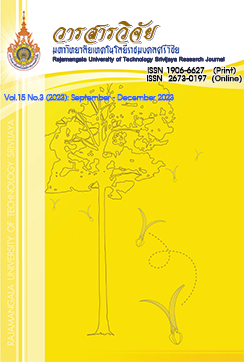Chatbot Adoption based on Lean Management: A Case Study of Interrogation Tasks in Betong Police Station
Keywords:
chatbot, dialogflow, police station, lean, informationAbstract
The Interrogation Department of Betong Police Station had service problems on Facebook Messenger. People had to wait a long time because of the insufficient manpower for 24 service hours and in the police lack of expert staff in every case consulting. Therefore, this research adopted the chatbot in Interrogation Tasks of Betong Police Station. The research objective was to: (1) design and develop the chatbot for supporting citizen laws service of Investigation Department in the police station, and (2) evaluate the efficiency based on Lean concept and assess user satisfaction with the chatbot. This chatbot was developed based on Lean concepts and plugged in with Facebook Messenger. The results showed that the new process or post Lean can reduce wasted time around 1.507.98 minutes (99.80%), and the percentage of efficiency was 100, increasing around 99.21 percent. In addition, the results indicated that the level of user satisfaction was high (4.09), and the system can interact quickly (4.19). These results indicated that users are satisfied with the chatbot adoption in Interrogation Department of Betong Police Station because the chatbot can reduce their waiting service time.
References
Chankaeo, W. and Chaikaeo, S. 2018. An Application of Chat Fuel for Public Relation, A Case Study of the Library Resources and Educational Media Center, University of Phayao. PULINET Journal 5(2): 137-147. (in Thai)
DeLone, W.H. and McLean, E.R. 2003. The DeLone and McLean model of information systems success: A ten-year update. Journal of Management Information Systems 19(4): 9-30.
Kruapanich, P. 2019. Develop a Rule-based chatbot approach VS AI based approach. Readmoreth. Available Source: https://bit. ly/2ZFliYY, October 25, 2021.
Pattarapantakul, T. and Kanchanasuwan, S. 202. Improving the Purchasing Process Using Lean Concept: The Case of Offshore Aviation Services Company. WMS Journal of Management 9(3): 90-101. (in Thai)
Promla, P. and Krootjohn, S. 2020. The Effect of using chatbot in blended learning for vocational certificate students in the colleges under the institute of vocational education northeastern region. Journal of Industrial Education 19(2): 100-110. (in Thai)
Rasrimil, T. and Wongcharoensangsiri, B. 2018. Efficiency Improvement of Goods Receipt and Return System a Case Study of Convenient Store. Kasetsart Applied Business Journal 12(16): 14-26. (in Thai)
Ruangthanu, S. 2021. G Suite for education and LINE Notification API Enhancement of Electronic Document System with G Suite for Education and Line Notification. Master Thesis of Science, Prince of Songkhla University. (in Thai)
Santirattanaphakdi, C. 2018. Online Marketing and Customer Service by chatbot Case Study: Chatfuel in Customer Interactive on Messenger. Sripatum Review of Science and Technology 10(1): 71-87. (in Thai)
Solis-Quispe, J.M., Quico-Cauti, K.M. and Ugarte, W. 2021. Chatbot to simplify customer interaction in e-commerce channels of retail companies, pp. 561-570. In International Conference on Information Technology & Systems. Springer, Cham.
Tangkraingkij, P. 2020. Application of Artificial Intelligence Chatbot for Learning. Royal Thai Air Force Medical Gazette 66(2): 64-73. (in Thai)
Tanmaneekool, B. 2019. Improving treatment plan response processes for medical tourism patients a case study of Vejthani hospital. Master Thesis of Business Administration, Thammasat University. (in Thai)
Yodwan, M. 2020. Applying lean principles for production waste reduction a case study of the plastic manufacturing process. Master Thesis of Engineering, Thammasat University. (in Thai)
Downloads
Published
How to Cite
Issue
Section
License
Copyright (c) 2023 Rajamangala University of Technology Srivijaya Research Journal

This work is licensed under a Creative Commons Attribution-NonCommercial-NoDerivatives 4.0 International License.
The content and information in the article published in Journal of Rajamangala University of Technology Srivijaya It is the opinion and responsibility of the author of the article. The editorial journals do not need to agree. Or share any responsibility.







